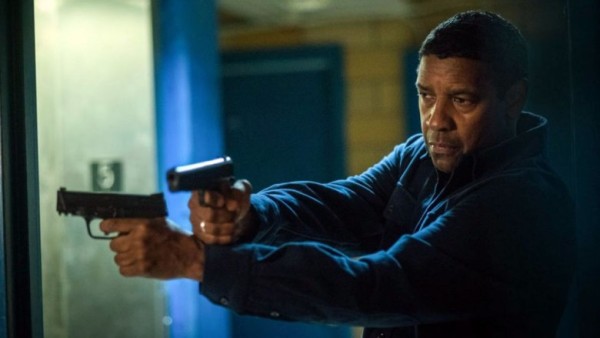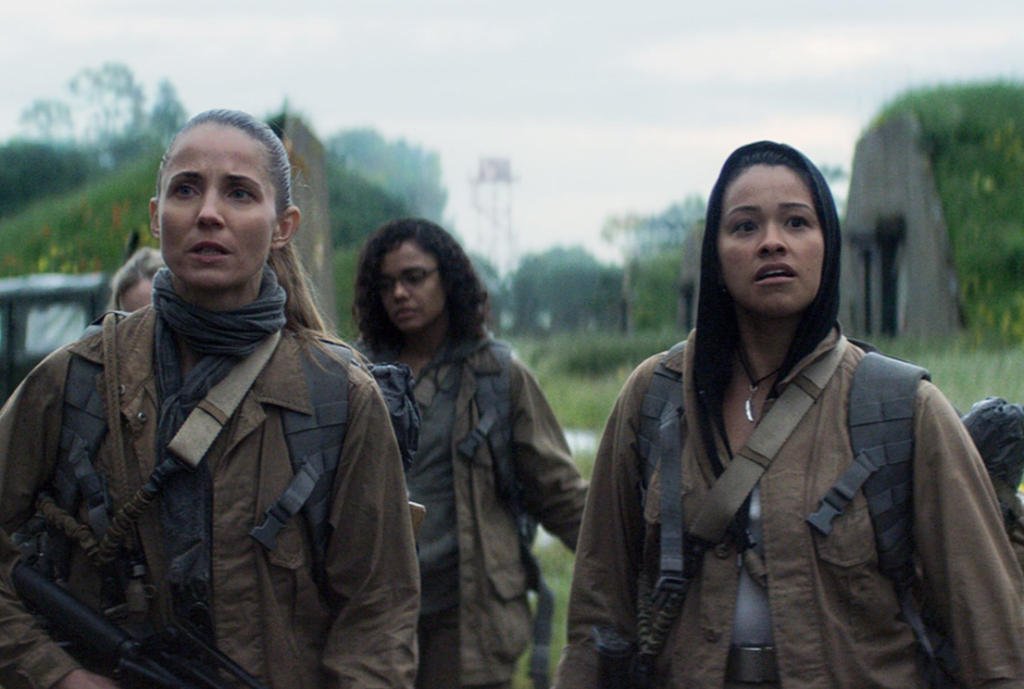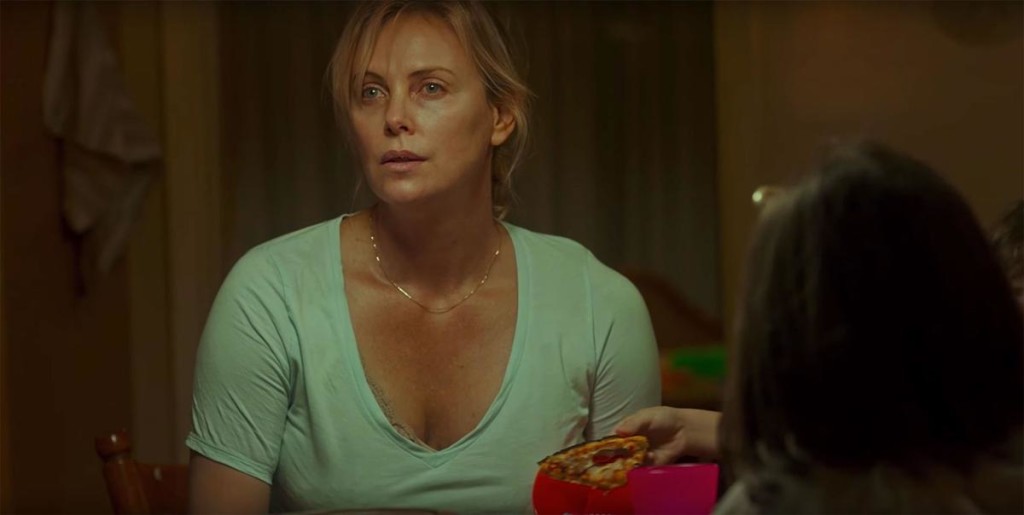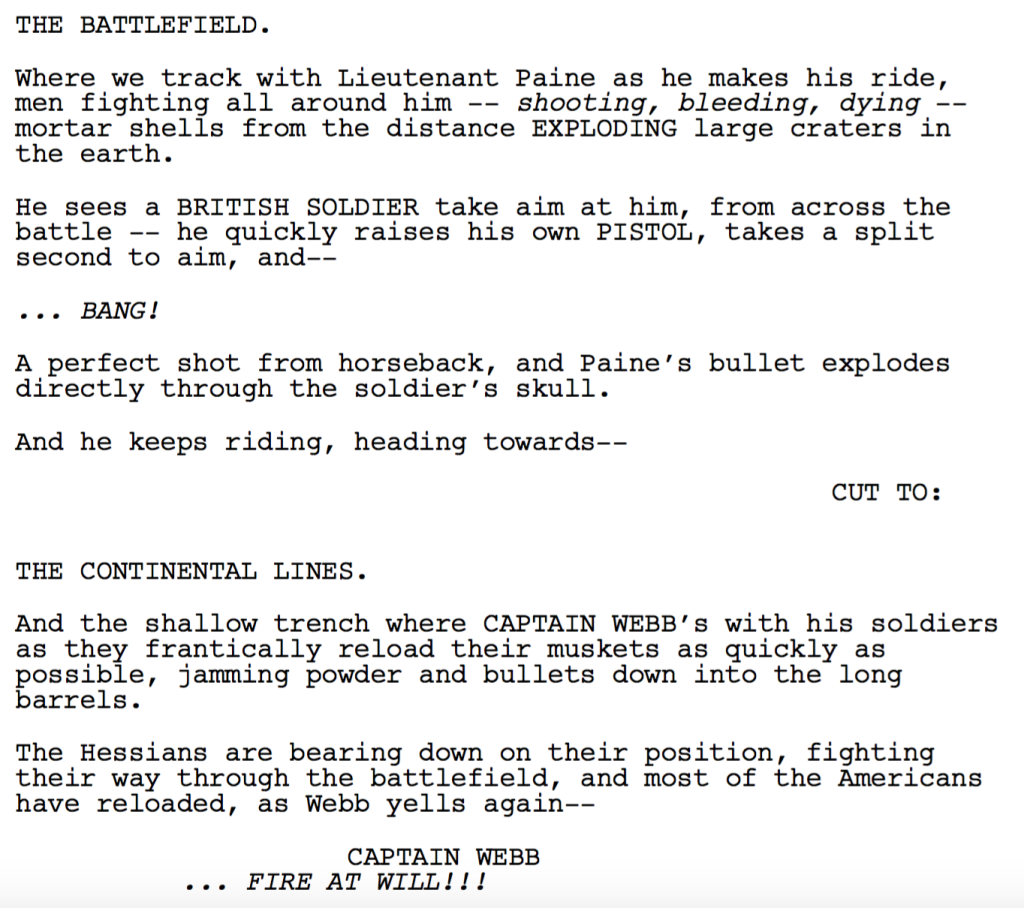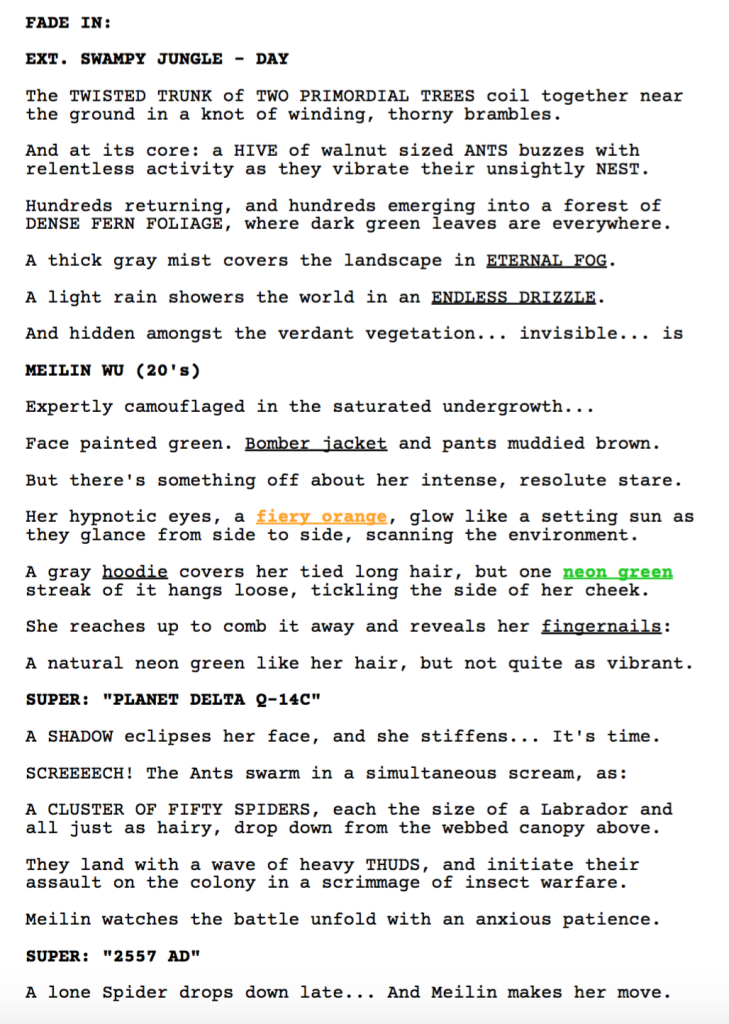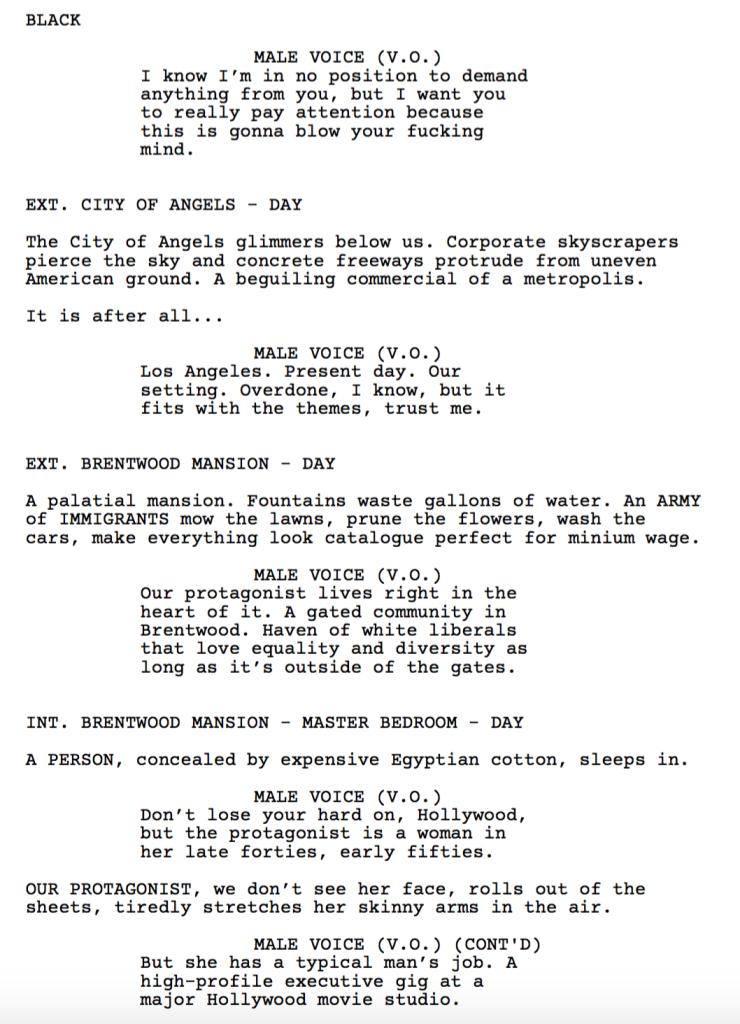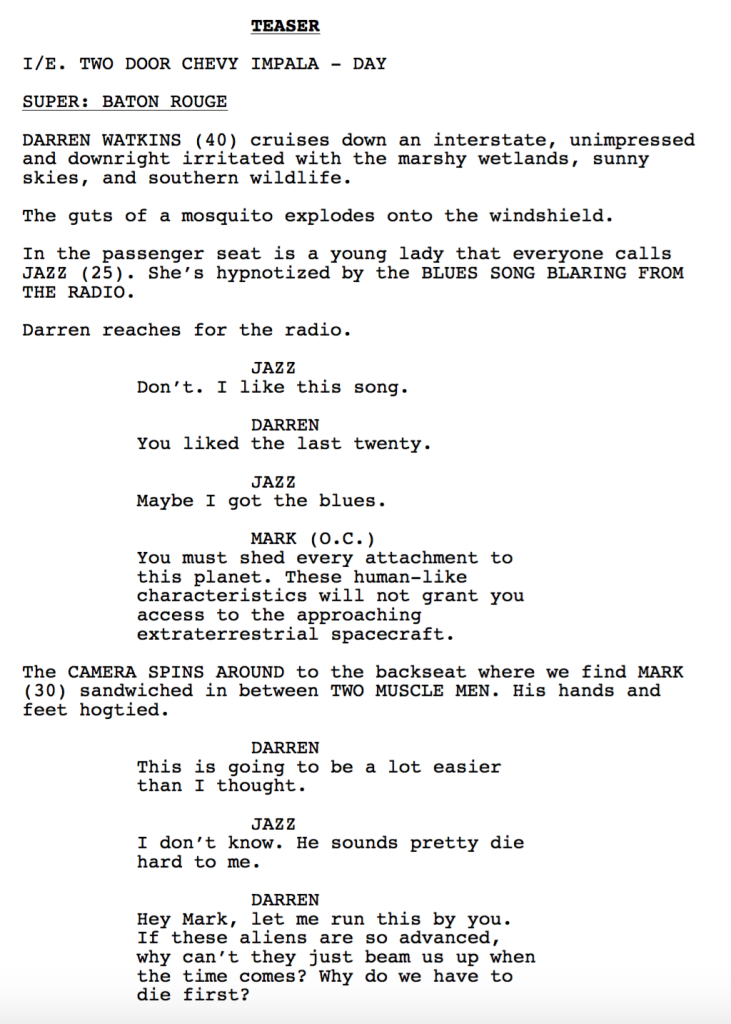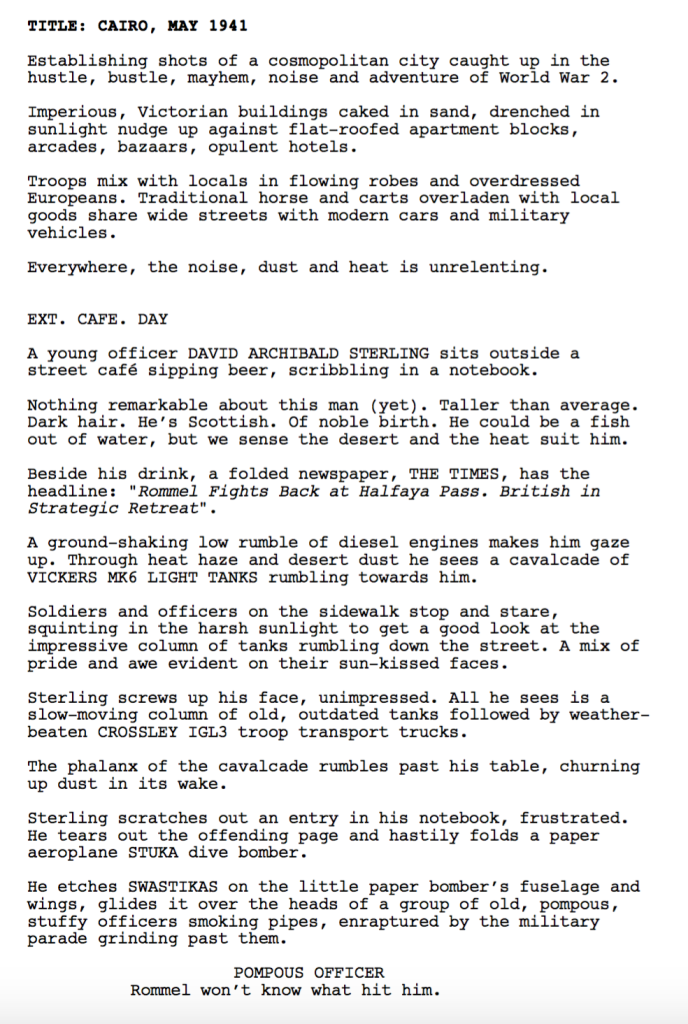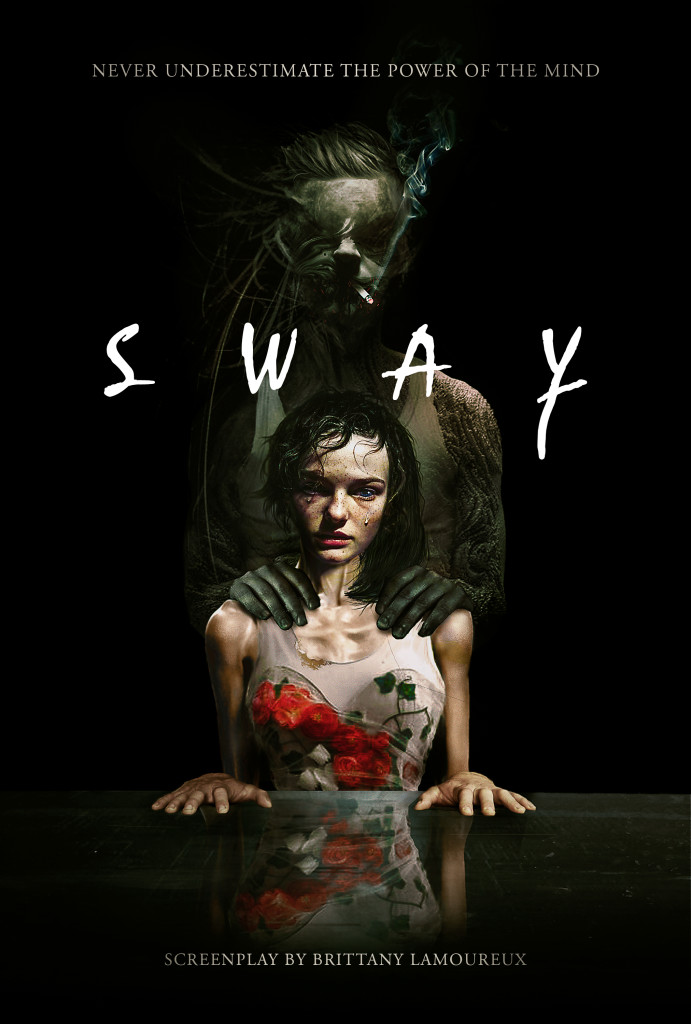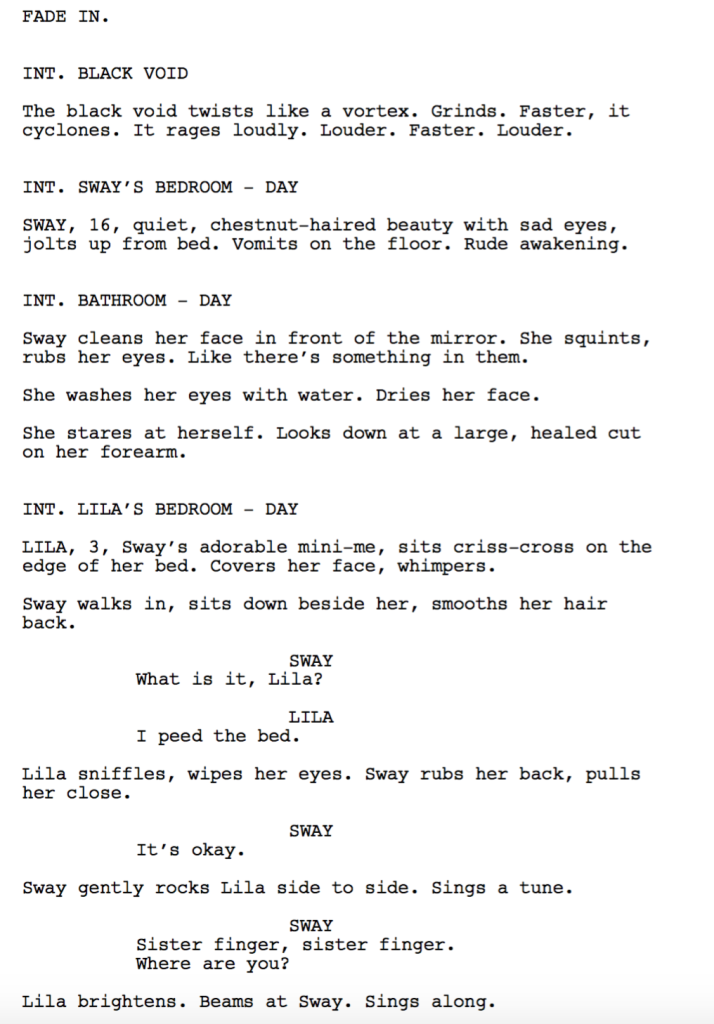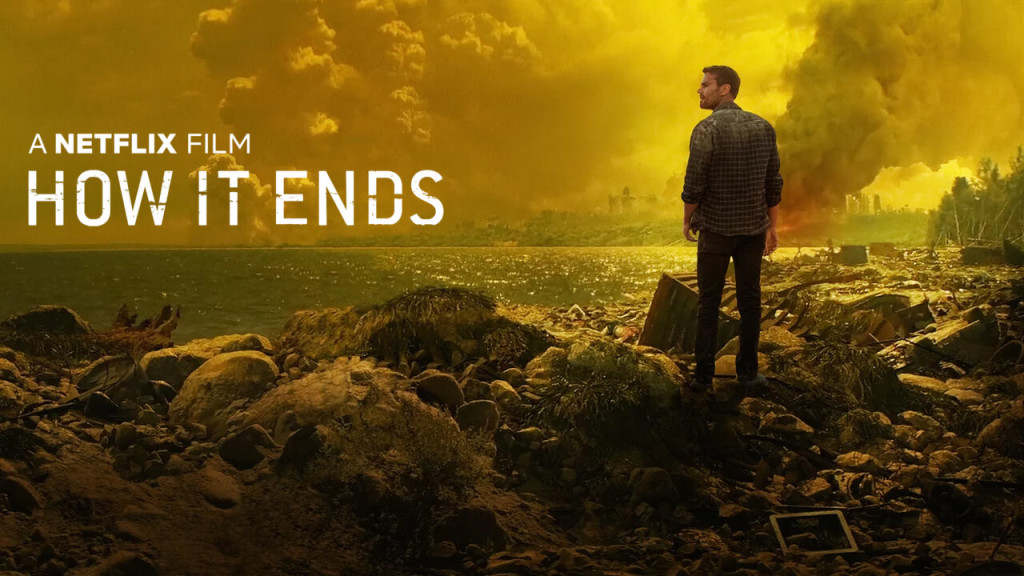Search Results for: F word
It’s time for an analysis of the 2018 box office. I know there are some people who consider box office analysis to be pointless (“Just because a movie makes money doesn’t mean it’s good!”). But box office remains the single most reliant indicator of what audiences want in a movie. In a world where entertainment options are more widespread than at any point in history, the act of taking 3 hours out of your night to drive to a theater and pay to see a movie is as strong of a vote for a film as you can make. Okay, let’s jump in!
1. The Equalizer 2 (1 wk. $44 mil, $47 ww) and The First Purge (3 wks. $62 mil, $98 ww) – The success of these two films excites me because it proves that it’s still possible for a screenwriter, without the pre-backing of a studio, to generate a franchise. Yes, I know, The Equalizer is technically based on a TV show. But it was essentially a spec script. The Purge (which is now moving into the TV space!) is probably a better indicator of what’s possible. A high-concept genre premise built on a clever contained narrative that has now become a money-printer.
2. A Quiet Place (15 wks. $187 mil, $332 ww) – I could point out the clever horror premise for the umpteenth time as the reason this movie became the second biggest box office surprise of the year. But I want to use this opportunity to highlight how a MONSTER elevates the marketing potential of a movie exponentially. There’s a shot in the first trailer for A Quiet Place where we’re creeping up a stairway and, on the wall are these giant scrape marks. What could’ve possibly done that? The only way to find out is to buy a ticket.
3. Black Panther (22 wks. $700 mil, $1.346 bil) and A Wrinkle In Time (17 wks. $100 mil, $132 ww) – I can’t believe that Black Panther made more money at the domestic box office than Avengers: Infinity War. I mean think about that for a second. That’s an amazing accomplishment. Meanwhile, A Wrinkle In Time bombed. I grouped these two films together because they represent a shift in Hollywood to produce films that include more diversity. So why did one succeed and the other fail? Because Black Panther placed its focus on writing a good movie first. A Wrinkle in Time, meanwhile, built its entire project around its message of diversity. In regards to ANY ART, nobody cares about the message unless the product is good. What’s that famous studio head quote? “If you want to send a message, use Western Union?” Your primary job when you write a screenplay is to ENTERTAIN. Nothing else matters unless you get that right. Never ever forget that as a screenwriter.
4. Annihilation (8 wks. $32 mil, no ww distribution) – I loved this movie. But let’s be real. It tanked at the box office. Annihilation is a reminder that there’s no market for big budget thinking man’s sci-fi. If you’re a thinking man’s sci-fi writer, you need to write screenplays with severely limited budgets. Think Primer or Alex Garland’s previous film, Ex Machina. The only successful thinking man’s sci-fi movies of the last decade are Arrival and Inception, which is more than zero, but not by much.
5. Game Night (17 wks. $69 mil) and Blockers (10 wks. $60 mil) – Comedies are struggling big time. Game Night and Blockers are the two biggest comedies of the year at 69 and 60 million dollars respectively. To give you some perspective, the original Hangover made 277 million dollars. Hopefuls like Tag (6 wks. $53 mil, $70 ww), Life of the Party (10 wks. $52 mil, $65 ww), and I Feel Pretty (9 wks. $48 mil, $88 ww) all underperformed. It’s looking really bad for the comedy genre. The only lesson I can glean from this is that Game Night and Blockers were both ensembles. And Blockers built a story around a wide demographic (by following a group of adults and a group of teenagers, you pull in both those demos). But should we really be propping up Blockers as the current comedy model to aspire to? I hope not. In a recent article, I noted that female-driven comedy specs still sell. Looking at 2018’s comedy numbers, I don’t know how much longer that trend will last.
6. Ready Player One (15 wks. $137 mil, $582 ww) – I know this movie didn’t do well at the box office (at least in the US). But it’s still a huge win for the writer, Ernest Cline. The odds of writing anything (much less something original) that will obtain the services of Steven Spielberg, is the movie equivalent of winning the lottery. I bring this up to remind you that the only way to write big budget material and get it made these days is to write it as a novel first. And while, in the past, that may have sounded daunting, it’s quite easy to do today with self-publishing. Don’t forget that one of the biggest sci-fi movies of the decade, The Martian, started off as a self-published novel.
7. Solo (8 wks. $212 mil, $388 ww) and Skyscraper (1 wk. $51 mil, $186 ww) – There’s a false narrative out there that audiences will eat up anything Hollywood throws at them. The failure of Solo (and to a lesser extent, Skyscraper), a product of the most lucrative franchise of all time, proves that that isn’t the case. Amongst numerous issues, Solo’s biggest failure was that it was unoriginal. It didn’t take chances. It didn’t give us anything fresh. Ditto The Rock’s Skyscraper. Let this be a lesson to screenwriters that you have to take chances somewhere if you want your material to stand out. Here’s an exercise for you. When you come up with an idea for a screenplay, close your eyes and imagine exactly how an audience would expect that movie to go. Got it? Okay, now don’t give them that movie. You can give them some of that movie. You can give them some of those characters. But never give it to them exactly how they expect it.
8. Avengers: Infinity War (12 wks. $677 mil, $2.04 bil ww), Sicario: Day of the Soldado (3 wks. $47 mil, $65 ww), and Rampage (14 wks. $99 mil, $425 ww) – Both Rampage and Sicario were box office under-performers. A big reason for that is that their stories were giant messes. I’m going to throw a phrase at you and I want you to internalize it: “Too many moving parts.” The fastest way for a script to derail is for it to have too many moving parts. Too many characters. Too many storylines. Too many subplots. Too many motivations. It becomes hard for the audience to remember what’s going on and so they mentally check out. Rampage had one of the most discombobulated plots I’ve ever read for what amounted to a movie about monsters climbing up buildings. And Sicario split its storyline up in such an odd and unnecessary way that it destroyed what was, at is core, an awesome idea. If you must write a script with a lot of moving parts, do what Infinity War did. Create an overarching storyline with a motivation so giant and so clear that it’s impossible for the audience to get lost: Thanos is trying to destroy half the universe.
9. Pacific Rim Uprising (8 wks. $59 mil, $290 mil ww) – The Pacific Rim movies fascinate me because, on the surface, they appear to have the makings of a top level franchise. Yet their dumpy box office take suggests otherwise. I think what I’ve learned when it comes to Pacific Rim is that you get one strange attractor per movie. You get dinosaurs in Jurassic World. You get giant beasts in Godzilla and King Kong. You get machines that can transform into robots in Transformers. The moment you add two strange attractors, you position yourself as a schlocky B-movie. Giant robots AND giant monsters? Ehhhh… It reminds me of Cowboys vs. Aliens. You have to pick one or the other. It makes me wonder what this franchise would be like if it was just giant robots fighting each other. (note: there are examples of this working. But there are more examples of it NOT working)
10. Hotel Artemis (6 wks. $7 mil, $8 ww) and Tully (5 wks. $9 mil, $14 ww) – I liked both of these scripts. But they both bombed at the box office. Here’s the thing. If you’re not writing a script within an identifiable blueprint (guy with a gun, heist film, contained horror, teen comedy) audiences don’t know what to make of it. That’s the trickiest thing about originality – is that you must mine it from a pre-established paradigm. Hotel Artemis isn’t really a gangster film. It’s not a guy with a gun film. I see that trailer and I don’t see a blueprint I recognize. Likewise, I see the trailer for Tully and I see a tired mom who hires a nanny. Had the nanny been a psychopath who’s going to terrorize the main character, seduce her husband, and steal her child – THAT’S A BLUEPRINT I UNDERSTAND. But just a mom who needs rest? Who’s going out of their way to see that film? Write outside of pre-established paradigms at your own risk.
BONUS CUT
Red Sparrow (14 wks. $47 mil, $151 ww) – Never ever write a screenplay with a main character who has a Russian accent. It has never ever worked in the history of the box office. I know why they continue to make this mistake (A-listers attach themselves to these films because they want to show their acting ability by playing a character with a Russian accent) but studios need to take a stand moving forward.
Carson does feature screenplay consultations, TV Pilot Consultations, and logline consultations. Logline consultations go for $25 a piece or 5 for $75. You get a 1-10 rating, a 200-word evaluation, and a rewrite of the logline. If you’re interested in any sort of consultation package, e-mail Carsonreeves1@gmail.com with the subject line: CONSULTATION. Don’t start writing a script or sending a script out blind. Let Scriptshadow help you get it in shape first!
Genre: Period/Action/War
Premise: Based on a true story, a young woman enlists in the Revolutionary War in a bid to help America win independence.
About: Today’s script was one of the big spec sales from 2016, fetching nearly seven figures due to an intense bidding war that Amy Pascal and Sony ended up winning. 33 year-old Christopher Cosmos ends up being one of the lucky first-time screenwriters to nab a big sale. The project is currently in development. But with its girl-power slant, it’s only a matter of time before the film gets made.
Writer: Christopher Cosmos
Details: 116 pages
Hollywood is in this new era where messages and agendas are becoming almost as important as the bottom line. Even when you’re promoting a more inclusive system, there are always people pointing out you’re not inclusive enough.
Take this weekend’s Mama Mia sequel, a film that is built around and stars multiple women. That should be championed, right? Not exactly according to some. Twitterverse couldn’t help but take shots at how the entire cast is as white as the inside of a coconut.
Don’t think for a second that the studios aren’t discussing these issues. And while they probably realize you can’t win over everyone, they’re going to try. Which is why any female-driven project is shooting to the top of the script pile these days.
I don’t care what a script is promoting or even what the subject matter is AS LONG AS IT’S GOOD. If you’ve got a great script to back up whatever you’re selling, I’m 100% with you. Let’s see if today’s script delivers.
20-something William Jaffers is living a nightmare. The trench he’s in is so filled with dead bodies that he has no choice but to stand on them while shooting at the approaching redcoats. When the British make a run at the Americans, William has no choice but to retreat.
While doing so, he watches two teenage brothers, James and Andrew Thomas, get shot. While dying, James makes William promise to deliver a letter he wrote to his parents. William survives the retreat and delivers the letter and devastating news to the Thomas family, and while there, takes note of a young maid named Deborah.
After William leaves, something comes alive in Deborah resulting in her wanting to join the war. The only problem is, it’s illegal for women to fight in the army. So Deborah has to sneak away, dress like a man, and join under false pretenses.
Ironically, after she joins, she’s assigned to be the assistant to a captain, which basically means she’s performing the same duties she did as a maid.
Deborah says “screw this,” and sneaks away to fight a mission to secure a bridge. Coincidentally, William is leading that mission. He notices something familiar in this new recruit, but doesn’t think much of it. Deborah performs heroically on the mission, helping obtain key British intelligence, which should help the Continental Army catch Lord Cornwallis, the leader of the British Forces.
Unfortunately, while prepping for the final battle, William discovers Deborah’s secret. Will Deborah be sent back to doing household chores? Or will William and the rest of the army realize they have one of the fiercest soldiers in the army – man OR woman – at their disposal?
American Rebel has one hell of an opening scene.
I’m talking Saving Private Ryan worthy. The way Cosmos describes the chaos of this battle placed me right in the thick of it.
But it’s not just the description of the battle. For these things to work, you have to introduce us to a character – in this case, William – and immediately make us like him so that we’re WORRIED for him. Without that emotional attachment, the words describing the battle mean nothing. They’re glorified description porn.
And this is something I alluded to yesterday. Stories don’t work unless we’re attached to the characters on an emotional level. Whatever approach or device you need to use to achieve that, do it. Cause if you think you can plop names down on the page and we’re going to give a shit, you can take your place in the Never Sell A Script Line.
Here’s the problem with American Rebel, though. It does a better job making us care about William than it does about Deborah. As a result, the script never quite works when it shifts to Deborah’s struggle. Because we always feel like even though this movie is about her, William is the guy who pulled us in.
To be honest, I’m not even sure why Deborah wanted to join the army. Two seconds after we meet her, William shows up to deliver the news about the dead sons. And, all of a sudden, Deborah’s determined to be G.I. Jane.
What were Deborah’s feelings about the war? What are her feelings about the British? What are her feelings about ANYTHING?? We don’t know. And therefore we’re kinda confused why she all of a sudden wants to fight. It would’ve made a lot more sense, for example, if she was the mother of these boys who were killed. Or the sister. But no. She’s just some random maid.
One scene could’ve solved this. Before William showed up, we could’ve had a dinner scene with the father and maybe some other men from town, and they’re all sharing their thoughts on the war and what’s going to happen, and Deborah, who’s serving them, can’t resist after a certain point, and interjects with her very opinionated take. Just one moment like that would tell us how passionate she was about this topic.
The rest of the script is a mixed bag. Cosmos is really good at describing action as well as delivering the occasional surprise. Things would happen in this script where I’d go, “Holy shit! I didn’t expect that to happen.” I always like being kept off-balance in a read. If I get too comfortable, it means I’m ahead of the writer. And Cosmos was always knocking me off my assumption perch.
But a lot of that was undermined by the handling of Deborah. I was never clear on what Cosmos was trying to do with the character. For example, Deborah’s secret is exposed three separate times, and there were zero consequences to any of it. The other character was slightly shocked, but ultimately shrugged their shoulders and said, “Who cares?”
So if nobody cared, why disguise yourself in the first place? This may sound nit-picky but if you’re going to build your story around the need to be disguised, then there needs to be consequences if that disguise is discovered. And there wasn’t. At the end of the script, I found myself pondering whether anything in the movie would’ve been different had Deborah been a male character.
Despite those issues, Cosmos did a really nice job with the historical details and the set-pieces here. I cared whether these characters were able to win this war and I was mostly looking forward to each sequence. For that reason, I give this script a worth-the-read.
[ ] What the hell did I just read?
[ ] wasn’t for me
[x] worth the read
[ ] impressive
[ ] genius
What I learned: Why does your hero want to go on their journey?? I’m amazed that writers overlook this question. Most of the time, the reason will be built into the premise. If there’s a serial killer and your hero is the detective assigned to the case, we don’t ever ask why he’s on this journey. He has to be. It’s his job! But for movies where that isn’t as clear, you, as the writer, need to make it clear. Or else we’re wondering the whole time why your character is even bothering. And in Cosmos’s defense, there is a scene at the end of the movie where Deborah’s asked this question and gives an answer. But it’s too little too late. We need to know that answer AT THE OUTSET. Or else we’re going to be confused the whole time.
What I learned 2: This is a good example of if you write a script in one of the 2 or 3 categories Hollywood is looking for at that moment, they’re willing to overlook weaknesses in the script.
Man, we’ve got a good line-up this week. A lot of times I’ll put a group of scripts together and think, “I don’t see a single winner in the bunch.” But today, we’ve got a few. I can’t share which ones I feel that way about, of course, because I don’t want to poison the voting pool. But this is the first pack I’ve seen in awhile that makes me confident a “worth the read” is on the horizon. For those playing Amateur Offerings for the first time, read as much as you can from each script and vote for your favorite in the comments section. The script with the most votes will receive a review next week!
And if you believe you have a screenplay that’s better than anything Hollywood is making at the moment, submit it for a future Amateur Offerings! Send me a PDF of your script, along with the title, genre, logline, and why you think people should read it (your chance to pitch yourself or your story). All submissions should be sent to Carsonreeves3@gmail.com.
Title: ABORT
Genre: Sci-Fi
Logline: Stranded on a remote planet with no memory of her past, a young woman struggles to fix her ship while trying to outwit a manipulative alien AI whose sole purpose is to repopulate its creator’s species by using her as a host.
Why You Should Read: ABORT is an edge-of-your-seat, unpredictable journey full of deception, twists, turns, and reveals, as our protagonist battles massive monsters, a dangerous climate, and conniving AIs… all while coping with amnesia. Billed as GROUNDHOG DAY meets ALIEN, ABORT provides constant goals and mini-goals, frequent ticking time bomb situations, and the stakes are as high as they could be… life or extinction. — While the use of color in the script has proven quite controversial, we are confident that it adds an extra layer to the read, and provides a much needed sci-fi ambiance necessary to set the mood of the futuristic, but isolated world we’ve created.
Title: A Writer’s Acts
Genre: Satire / Thriller
Logline: After a mysterious writer blackmails her through a pitch that reveals her darkest secrets, a meek female executive must take matters into her own hands to discover the source.
Why You Should Read: I constantly hear about how trendy “female-driven” and “Jane Wick” specs are, so I decided to write a female-driven Jane Wick that resulted in being about as far away from John Wick as possible. — This might be a cutting satire of Hollywood and filmmaking on the surface, but at its heart this is a story of female empowerment, institutionalised misogyny and liberal hypocrisy. So relevant in the era of #MeToo and Harvey Weinstein. And I guarantee you that all of these issues are handled without ever getting preachy or partisan. — Script also made it to the Semifinals of the Script Pipeline Screenwriting competition.
Title: Follow ME
Genre: TV – One Hour Drama
Logline: Follows the life of a cult deprogrammer who uses unlawful methods to liberate individuals believed to be brainwashed by controversial belief systems, all while struggling to find peace within himself.
Why You Should Read: I became fascinated by the world of cult deprogramming after reading strories about Ted Patrick, who is considered the “father of deprogramming”. Deprogramming refers to the act of forcibly removing someone from a cult, holding them against their will in an undisclosed location, and using psychological methods to unbrainwash them. The work of a deprogrammer can be liken to the job of an exorcist. You basically have a person who is under the influence of someone else, and it’s up to the deprogrammer to rid that person of that influence. With groups like NXIVM and Scientology being featured heavily in recent headlines, psychologist Steve Eichel estimates that up to 10,000 cults still exist today…and they are more dangerous than ever. People’s lives are being ruined. People who have families that love, care, and depend on them. These families hire deprogrammers to save their loved ones…no matter the cost. Although “Follow ME” is a fictional story set in present day New Orleans, a lot of what happens in the series is all too real.
Title: DEATH FROM ABOVE
Genre: Action/War
Logline: In WW2, during the darkest days of 1941 when Rommel was overrunning North Africa, a brilliant unorthodox Commando David Sterling singlehandedly recruits and transforms a bunch of unruly, undisciplined commandoes into the world’s deadliest strike force, the SAS.
Why You Should Read: WW2 is a period of military history which I love. For me, some of the greatest movies of all time have a link to this monumental, global fight for freedom. DEATH FROM ABOVE is a product of that passion, an unbelievable, untold, true story about the birth of the SAS in North Africa in 1941. DEATH FROM ABOVE fictionalizes real events to bring alive Sterling’s heroic battle against the stuffy British establish and Rommel’s formidible Africa Korps to form the world’s first strategic guerilla warfare unit — the SAS. It’s also a story of the unique men who formed this elite unit and their disastrous first ever mission OPERATION SQUATTER. DEATH FROM ABOVE has been written with franchise potential in mind, so just deals with the birth of the SAS and covers the period until the fateful first mission. The script also hopefully qualifies as one of the hot selling topics according to Scriptshadow, a based on true events WW2 story.
Title: Sway
Genre: Drama/Sci-fi
Logline: Sway, A talented high school pianist with a hard home life gains the power of mind control but must strengthen it if she hopes to escape the clutches of her abusive, drug-pushing cousin.
Why You Should Read: Hey, name’s Brittany! I may not comment much but I read SS everyday. Been reading, absorbing, mostly writing. I come here with a script I’ve been working on for a little while. I’ve always wanted to write a “superpower” story set in the real, real world with very personal stakes for the main character rather than world altering ones. There’s very little special effects and no over the top sci-fi jibber jabber. It’s pretty contained and written with a low budget in mind. Chiefly, this is a story about how abuse victims grow defense mechanisms to help cope with their abusers. In this case, the victim gains an actual superpower. I look forward to any helpful feedback from Carson and the awesome SS community!
One last note! If you’re going to criticize loglines or first pages, please do so in a way that’s constructive. I’ve seen a lot of bitter responses to loglines lately. We’re all here to help each other, not make each other feel bad. It’s easy to reword a negative critique into something that gets your point across yet inspires the writer to improve. Thanks.
One of the most important factors in getting noticed as a screenwriter is writing a screenplay that Hollywood actually wants to make. This is one of the BIGGEST pitfalls I see writers fall into. I receive an endless number of scripts – scripts I even put in Amateur Offerings – that I know Hollywood will never be interested in. It’s just not their jam to make that movie. The secret to selling anything in life is understanding what your buyer wants. These are the ten movies the buyer (Hollywood) wants right now.
1) Girl with a Gun – It’s still a trend. It’s still marketable. We’ll see what happens when the big studio versions of these films start hitting theaters en mass. Maybe the movies will fizzle and the trend will die. But that time is not now. I’d like to remind you that when a trend hits its downslope, there is still opportunity to pillage its fruits. You simply combine the genre with another genre. A Girl in a Western with a gun. A Girl in a Horror movie with a gun. But the spirt of the original idea has to be there. Don’t give me a Girl in a Western with a gun who shoots her gun twice the whole movie.
Shout Out To: Guy With a Gun! These movies still sell. You just have to be more clever with your premises than Girl With a Gun movies. John Wick and The Equalizer won’t work anymore. You need an idea with a bit more creativity behind it.
2) Biopic – Just to be clear, Biopics refer to long-form character studies, meaning we see the character grow up over several time periods. If you’re only covering a short section of a person’s life (a week or a month) I’d place that more in the “true story” category. Biopics would be movies like the upcoming Bohemian Rhapsody, The Theory of Everything, and The Aviator.
Shout Out To: Clever narratives. To compete in the competitive biopic market, come up with a clever way into the genre. Steve Jobs is a good example of this. Instead of following Jobs’s life continuously, Sorkin focused on his three biggest product announcements.
3) True Story – The true story genre often gets mixed up with the biopic genre because true stories focus on real people and therefore we assume we’re reading a biopic. But true stories are more about covering one specific event in a person’s (or people’s) life. Mayday 109, an upcoming movie about a young John F. Kennedy saving a bunch of people after their boat sinks. The upcoming Pale Blue Dot, about a female astronaut traveling across the country to kill the fellow astronaut she had an affair with. The upcoming I’m Proud of You, about a depressed man who found a new lease on life when he befriended Mr. Rogers.
Shout Out To: Trashy real-life stories. Everyone thinks that if they’re going to adapt a true story, it needs to be serious and say something about the world. Let’s not forget that the infamous Zola The Stripper Twitter novel is anything but serious. That didn’t stop it from selling and getting made into a future film.
4) Social Issues – It’s hard to tell what’s going to happen with Social Issues screenplays moving forward. In the past, these movies have been relegated to low-budget indie dramas, like Fruitvale Station. But with The Black List being so liberal leaning, more and more social issues scripts are dominating the list. Just this past year we have a movie about the power of abortion, a Malcom X story, the Civil Rights case of Dr. Ossian Sweet, a second script about a famous abortion clinic, and even a script called “Social Justice Warrior.” With the recent transgender revolution, I’m expecting 3 or 4 scripts about transgenders to hit the 2018 Black List. Might yours be one of them?
Shout Out To: Writers who aren’t using social issues as a means of virtue signaling. Many social issues are complex and require a balanced look at what’s causing the issue. Your script is going to stand out if you respect that complexity.
5) World War 2 – There were no fewer that EIGHT World War 2 themed scripts on last year’s Black List, including two (Ruin and Keeper of the Diary) in the Top 5. World War 2 is a genre that routinely goes up and down but can always be depended on. Eight scripts makes it the most dominant subject matter on the list by far.
Shout Out To: Using real life events in World War 2 as inspiration to create your own story. One of the problems with true World War 2 stories is that the best ones have all been taken. If you use events and people as inspiration for a jumping off point to write a gnarly new take on the war, you have a shot at standing out from the crowd. This is what Ruin, the number one script on the list, did. Likewise with the newest script to make my Top 25, Max Landis’s Shadow in the Cloud (sorry no link – this review can only be accessed on the Scriptshadow Newsletter).
6) Contained Horror – Contained horror is still the NUMBER 1 WAY TO BREAK INTO HOLLYWOOD. If you can, make sure your contained horror movie contains either a ghost or a monster. Horror films without monsters are much tougher sells (though there are exceptions, like Get Out). How easy is it to break in with horror? They made a movie about the game Truth or Dare. It doesn’t take much to impress, guys. As long as your script is scary.
Shout Out To: Event Horror and Creature Features. After the success of It, we’re going to be seeing more big budget event horror in the coming years. Right now, this is an IP only avenue. But I expect that to change if someone writes a really scary big budget horror spec. Creature Features, while not as popular as they used to be, still have huge upside. Hollywood’s going to look at anything that has franchise potential for the next 30 years.
7) Contained Thriller – A Contained Thriller is typically a one-location thriller. Something like Phone Booth, Panic Room, or 127 Hours. This genre does well because it’s easy to market (you see a guy, a gun, a bomb, and time running out, and you instantly know what you’re getting) and doesn’t cost much.
Shout Out To: Limited Thrillers. A Limited Thriller covers more area than a Contained Thriller but is essentially the same thing with a higher price tag. The Commuter, where Liam Neeson is on a train, would be a Limited Thriller. Obviously, since the pool of people who can produce your movie goes down once you increase the price tag, you’ll have less of a chance at a sale with a Limited Thriller.
8) Female-Centered Comedy – I think there are more comedies in development with females at the moment than with males. So the odds are in your favor by writing something with a woman in the lead role.
Shout Out To: Scripts that don’t just take a male-lead idea and switch the lead to a female. Try and build your female comedy idea from the ground up. I don’t think it’s a coincidence that Bridesmaids remains the cream of the crop in this genre.
9) Action Comedy – If you’re thinking of writing a comedy, seriously consider making it an action comedy. Remember, comedy doesn’t travel well. People in Myanmar don’t laugh at Seth Rogen getting high jokes. Central Intelligence, Spy, Tropic Thunder, Rush Hour, the upcoming The Spy Who Dumped Me. That’s where comedy is going right now.
Shout Out To: Male-Female Team-Ups. In the past, all we got for action comedy was male team-ups. More recently, we’ve focused on female team-ups. This leaves one slot left to take advantage of: a team-up with a man and a woman. They’re doing this with the upcoming Night School. Expect more of this in the immediate future.
10) Old IP – Old IP is IP that’s now in the public domain and can therefore be used by anyone. This is one of the biggest cheat codes there is in the business. You get to write about someone that everybody in the world knows and don’t have to pay a dime for it. Last year they made a King Arthur film. Later this year we’re getting a Robin Hood movie. There are several other Robin Hood movies in development. You’ve got Shakespeare. You’ve got The Count of Monte Cristo. The Wizard of Oz, Tom Sawyer, The Three Musketeers. Hollywood will always buy this stuff if you can come up with a fresh take.
Shout Out To: Anyone who can take these characters and place them in the modern day in a cool way. I’ve seen so many Robin Hoods set in 1740. I’m numb to that image. But a Robin Hood set in the present? Or the future? That I would be into.
One final thing before I go. If you have THE GREATEST MOVIE IDEA EVER and it doesn’t fall into any of these categories, you should still write it. A good movie idea is a good movie idea. But do me a favor and run the idea by a couple of friends (or me, if you want someone who’s heard every idea imaginable) first. At least one of them should be bonkers excited and agree that the idea is amazing.
Carson does feature screenplay consultations, TV Pilot Consultations, and logline consultations. Logline consultations go for $25 a piece or 5 for $75. You get a 1-10 rating, a 200-word evaluation, and a rewrite of the logline. If you’re interested in any sort of consultation package, e-mail Carsonreeves1@gmail.com with the subject line: CONSULTATION. Don’t start writing a script or sending a script out blind. Let Scriptshadow help you get it in shape first!
Today I take a look at one of my Top 25! scripts and how it translated to the Netflix screen.
Genre: Action/Thriller
Premise: (from IMDB) When a mysterious disaster turns the country into a war zone, a young lawyer heads west with his future father-in-law to find his pregnant fiancée.
About: How It Ends shot into my Top 25 back in 2011. Since then, it’s gone through many “almosts” in getting made. It took the determination of the Netflix machine to change the project’s fortunes. The film debuted this weekend on the streamer. It stars Theo James (The Hunger Games) and Forest Whitaker. It was directed by David Rosenthal, whose previous credits include The Perfect Guy and A Single Shot. Brooks McLaren was an unknown writer when his script made The Black List back in 2011. He’s currently working on the “Rambo: New Blood” script.
Writer: Brooks McLaren
Details: 113 minutes
Some of you may remember this script from a looooong time ago. I read it and instantly fell in love with it, enough to clear room in my Top 25. Finally, after seven long years, the movie’s been made. And thank goodness for Netflix. I have no doubt How it Ends wouldn’t have seen the light of day without the service.
I may have issues with Netflix. But you have to love the fact that they’ve single-handedly brought back the mid-budget film. They don’t make these movies for theaters anymore. Especially if they don’t have a marketable genre component to them – like zombies. Every time I dog Netflix, I have to remind myself of that.
For those who don’t remember, How it Ends is about a lawyer, Will Younger, who’s on a business trip in Chicago, talking with his fiancé back in Seattle on Skype, when all of a sudden a loud banging noise occurs off-screen. Scared, his fiancé says she needs to check it out and then – FWIP – the feed cuts out. And it’s not just the Skype feed. All feeds from the West Coast cut out. Nobody knows what’s going on over there.
It just so happens that Will’s fiancé’s dad, Tom, lives in Chicago. Will’s been avoiding Tom because Tom doesn’t like him. But he has to see him now. As the West Coast situation worsens, Tom and Will decide to drive to California to get to the fiancé. Along the way, their car breaks down near a Native American reservation, and they’re forced to ask for help from a young Native American woman, who ends up coming with them. However, the closer they get to the coast, the more chaotic the world gets. Will they be able to overcome these odds and get to Seattle in time???
Before I get into the script stuff, I’m going to say some things that are going to make it sound like I’m making excuses for a script that some people thought was never that good in the first place. And I’m okay with that. Because I know I’m right. :)
Never has it been so apparent how much a movie suffers when it doesn’t have a good director. This film was terribly directed. For starters, the cinematography was awful. Every shot had the background blown out and the actor’s faces in darkness, making it impossible for me to see basic things like facial expressions.
But the silent killer was the sound design. The entire movie was done through ADR. ADR (additional dialogue recording) can work as a patch. The problem with doing it the whole movie is that nobody sounds real. The voices are too smooth, too calm. And the reason they’re too smooth and too calm is because the actors are in a quiet comfortable booth recording their lines. In addition to there being a disconnect between the true performance and the more relaxed audio performance, the audio quality is too slick and too clean to not draw attention to itself.
I can’t convey enough how much this pulled me out of the movie. It was like watching one long lip-sync.
There were other problems with the direction as well, such as the fact that the night-time car scenes looked like they were shot on an iphone with a 3-point Lowell lighting kit from BP Photo. And I get it. This movie doesn’t have a huge budget. But part of your job as a director is to make stuff look better than the budget you’ve been given. Can you imagine what Coralie Fargeat would’ve done with a movie like this? Her film looked amazing and it was shot for a lot less than this one.
I read How it Ends at a time when I was in full GSU mode (Goal, stakes, urgency). It was one of the best embodiments of the formula I’d read up to that point. We’ve got a clear goal – get to the fiancé. Clear stakes – if we don’t, she dies. Clear urgency – Every passing moment society is falling more and more apart.
On top of that, we have a turbo-boost to the GSU formula: a giant mystery at the center of the film. What’s happened that’s causing all of this? Even if you’re not totally invested in the pursuit itself, you can’t help but wonder what’s going on.
On top of THIS, you’ve got a central character pairing that’s packed with conflict – the dad who doesn’t think the fiancé is good enough for his daughter. When you’re sending a character out on a long journey, you need a way to build drama into each scene. Stuffing two characters who don’t see eye-to-eye into a tight space for two hours is guaranteed drama.
All of these things were in the script yet I felt none of them onscreen.
Why?
That’s hard to figure out. I’d begin with the situation itself. In the script, the implosion of society and threat of an unseen menace was way more intense. Whereas in the script, things were ramped up to a 9. In the film, they were around a 5 or a 6. Wherever they went, things seemed calm. There weren’t a lot of crazies running around. You were convinced they could handle any problem.
For example, there were two major roadblocks early in the film. And they were able to get through simply by asking. In screenplays, you gotta make everything tough for your hero. Especially in a movie like this, where the world is falling apart. This idea is built for making things tough.
Then, later, in the one roadblock scene that wasn’t easy – a bridge they needed to cross – they turned it into this really cheesy Karate Kid scene with a couple of guys on dirt bikes who chased after our heroes. You gotta WIN each scene as a filmmaker. And in three of the biggest scenes, they lost.
Then there were little problems that added up. Such as the fact this entire icy relationship between the father and the fiancé-in-law is built on the idea that the son isn’t good enough for his daughter. Yet the son was a) strong and chiseled out of stone, an ideal protector, b) smart, c) presentable, and d) had a good job. This is the kind of man any normal father would be ecstatic his daughter was marrying. Yet we happened to have the one dad who didn’t like him.
Why is this an issue? Because when there’s a disconnect between what the audience is seeing and what the father is seeing, it feels like the only reason the father is acting that way is because the writer needs him to to act that way for his story to work. They could’ve solved this by casting someone who looked more like the kind of person a father didn’t think deserved his daughter. A Shia LaBeouf type, for example. Untamed, rough around the edges, a wild card.
And there were these tonal missteps. At one point, the group gets to an abandoned water park and the Native American girl jumps out of the car with a giant smile on her face and leaps into the pool, laughing excitedly at the chance to cool off. It was supposed to be the scene equivalent of a drink. Something to take the edge off after a long day.
Except that in every scene up to that point, Native American Girl had been the most dire, sad, miserable, human being in the world. The act disobeyed the very essence of her character make-up. You can’t just change who people are to fit a scene. You have to stay consistent. And the irony is, the movie could’ve used a sense of humor. It would’ve been smart to have more scenes where the characters were laughing so as to break up the enormously intense heaviness that permeated the movie.
I always try to remind writers that. The reader can’t appreciate the bitter unless they get the sweet. And vice versa. You can’t go crazy of course. You shouldn’t be putting Anchorman scenes in a movie like this. But you need the occasional bright spot if only to jolt the reader out of their malaise.
I’m not sure how to categorize this one. It’s on Netflix so it won’t cost you any money. So is it worth a free watch? I suppose it is if you’re doing background watching. But if you’re setting aside time just to watch a movie, you’ll probably be bored.
[ ] What the hell did I just watch?
[x] wasn’t for me
[ ] worth your time on Netflix
[ ] impressive
[ ] genius
What I learned: As much as it pains me to say this, movies like this struggle to get made because they don’t have a clear monstrous presence that can be marketed. In other words, there are no aliens. There are no zombies. There are no monsters. When audiences see trailers like this, it’s confusing for them. Because they ask, “Where’s the threat?” The threat, of course, is us (humanity). But people who just want to watch a fun movie don’t see it that way. They see a hole that hasn’t been filled. Anyone who watched this probably left saying, “That’s it?” The reason is the lack of that marketable element.

